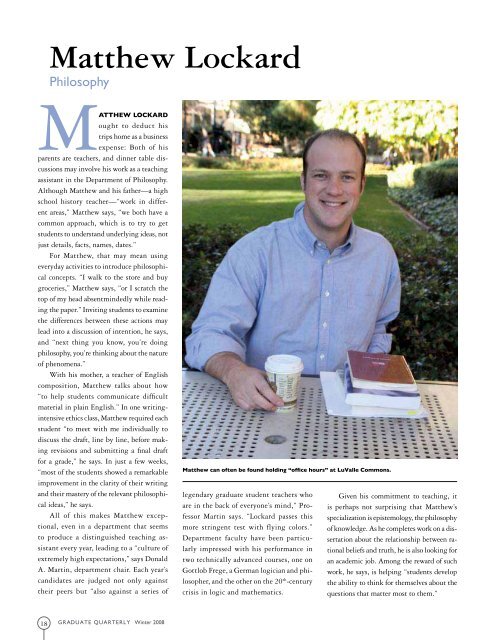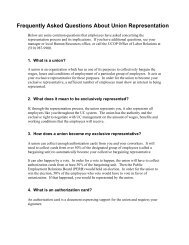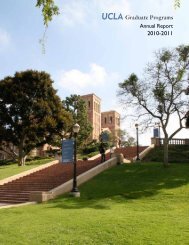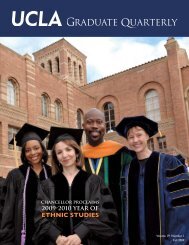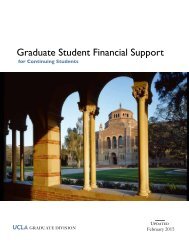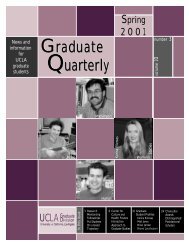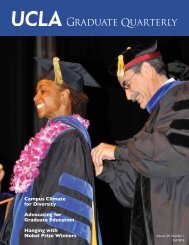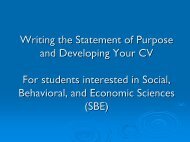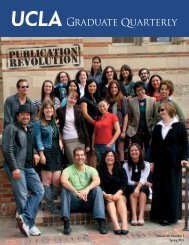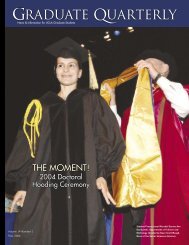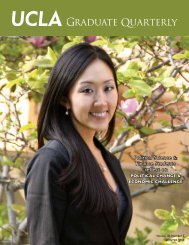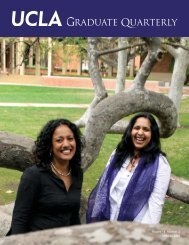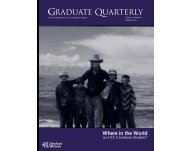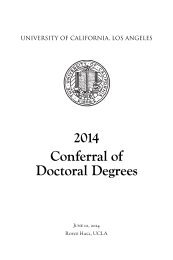Graduate Quarterly - Winter 2008 - UCLA Graduate Division
Graduate Quarterly - Winter 2008 - UCLA Graduate Division
Graduate Quarterly - Winter 2008 - UCLA Graduate Division
Create successful ePaper yourself
Turn your PDF publications into a flip-book with our unique Google optimized e-Paper software.
Matthew Lockard<br />
Philosophy<br />
MATTHEW LOCKARD<br />
ought to deduct his<br />
trips home as a business<br />
expense: Both of his<br />
parents are teachers, and dinner table discussions<br />
may involve his work as a teaching<br />
assistant in the Department of Philosophy.<br />
Although Matthew and his father—a high<br />
school history teacher—“work in different<br />
areas,” Matthew says, “we both have a<br />
common approach, which is to try to get<br />
students to understand underlying ideas, not<br />
just details, facts, names, dates.”<br />
For Matthew, that may mean using<br />
everyday activities to introduce philosophical<br />
concepts. “I walk to the store and buy<br />
groceries,” Matthew says, “or I scratch the<br />
top of my head absentmindedly while reading<br />
the paper.” Inviting students to examine<br />
the differences between these actions may<br />
lead into a discussion of intention, he says,<br />
and “next thing you know, you’re doing<br />
philosophy, you’re thinking about the nature<br />
of phenomena.”<br />
With his mother, a teacher of English<br />
composition, Matthew talks about how<br />
“to help students communicate difficult<br />
material in plain English.” In one writingintensive<br />
ethics class, Matthew required each<br />
student “to meet with me individually to<br />
discuss the draft, line by line, before making<br />
revisions and submitting a final draft<br />
for a grade,” he says. In just a few weeks,<br />
“most of the students showed a remarkable<br />
improvement in the clarity of their writing<br />
and their mastery of the relevant philosophical<br />
ideas,” he says.<br />
All of this makes Matthew exceptional,<br />
even in a department that seems<br />
to produce a distinguished teaching assistant<br />
every year, leading to a “culture of<br />
extremely high expectations,” says Donald<br />
A. Martin, department chair. Each year’s<br />
candidates are judged not only against<br />
their peers but “also against a series of<br />
<br />
legendary graduate student teachers who<br />
are in the back of everyone’s mind,” Professor<br />
Martin says. “Lockard passes this<br />
more stringent test with flying colors.”<br />
Department faculty have been particularly<br />
impressed with his performance in<br />
two technically advanced courses, one on<br />
Gottlob Frege, a German logician and philosopher,<br />
and the other on the 20 th -century<br />
crisis in logic and mathematics.<br />
Given his commitment to teaching, it<br />
is perhaps not surprising that Matthew’s<br />
specialization is epistemology, the philosophy<br />
of knowledge. As he completes work on a dissertation<br />
about the relationship between rational<br />
beliefs and truth, he is also looking for<br />
an academic job. Among the reward of such<br />
work, he says, is helping “students develop<br />
the ability to think for themselves about the<br />
questions that matter most to them.”<br />
18 GRADUATE QUARTERLY <strong>Winter</strong> <strong>2008</strong>


